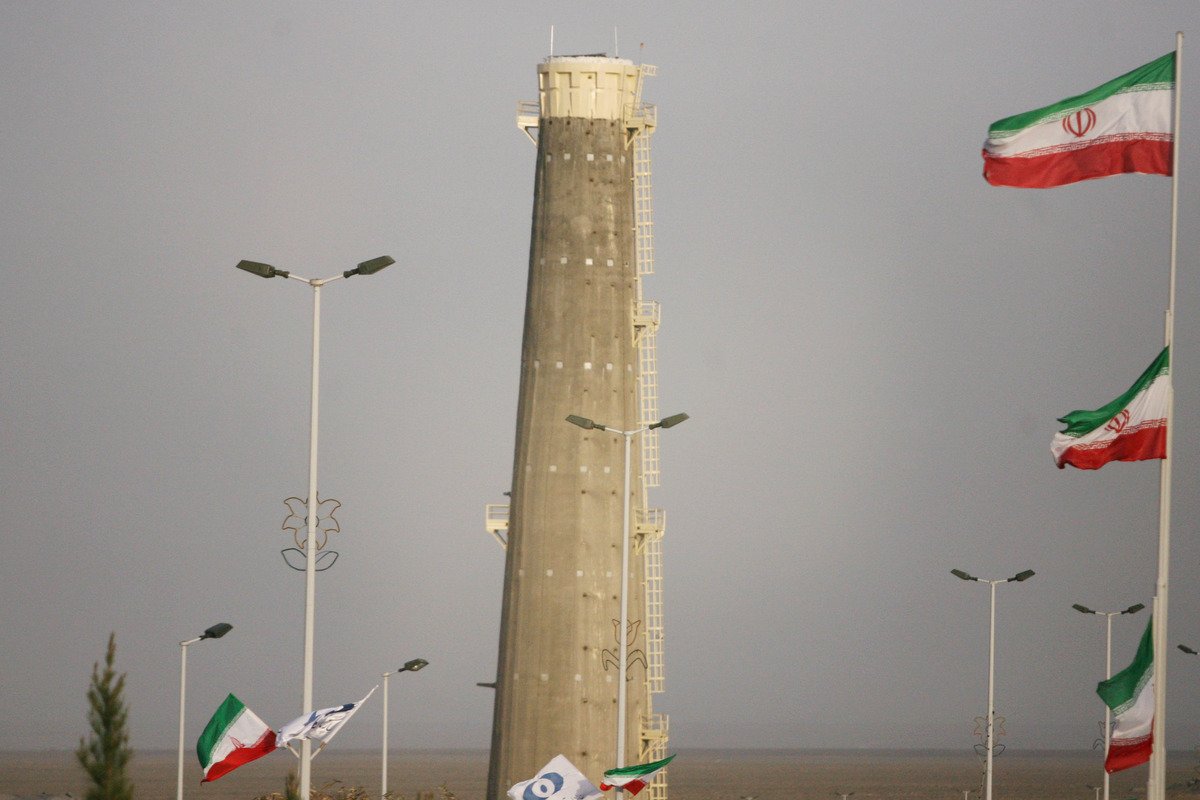Iran could have an operational nuclear weapon within "weeks, maybe days," a former Israeli ambassador to the U.S. said, as Israel closely watches whether Iran could quickly pivot and create a nuclear weapon before next month's change of administration in Washington.
Michael Oren told Newsweek that Iran will be dreading President-elect Donald Trump's return to the White House, adding that Tehran wouldn't "dare" to make the final push toward an operational nuclear weapon once the new administration takes over.
Iran says its nuclear development, which had been curbed by now-lapsed restrictions, is peaceful and not intended to make weapons. But Iranian officials have started to publicly float whether Tehran should abandon this track, and analysts say it would not be difficult for Iran to take the final step toward a weaponized nuclear program.
Iran has enough highly enriched uranium to make three or four relatively low-yield nuclear bombs, according to expert estimates.
Iran may not have decided to make a nuclear weapon yet, but Tehran has certainly done its best to make sure it could do so very rapidly, said William Alberque, a visiting fellow at the Henry L. Stimson Center and a former director of NATO's Arms Control, Disarmament and WMD Non-Proliferation Center.

There is "not a lot of time at all" until January 20, when Trump will be inaugurated, said Oren, who was ambassador from 2009 to 2013. But "it's enough time for them to make a nuclear weapon" if Iran resolves to do so.
"This is a point I can't stress enough—that we're in a very perilous period," he added. "I don't think they'll dare do this on Trump's watch."
Although Israel has an "incredible degree" of intelligence insight regarding Iran, Israeli authorities may not know if, or when, Iran makes the decision to move forward with a nuclear weapon, Oren said. Officials and experts stress it is not clear whether Tehran has determined to push through the final stages toward a nuclear weapon.
If they do, though, "we're talking about weeks, maybe days" until they have an operational nuclear weapon, Oren said, although this assumes Tehran has a warhead to match.
Iran and the Nuclear Deal
A 2015 agreement, known as the Joint Comprehensive Plan of Action (JCPOA), or simply as the Iran nuclear deal, relieved sanctions leveled against Iran in exchange for new limits on Tehran's nuclear program. Also, the powers involved at the time tried to limit weapons sales to and from Iran, as well as the country's ballistic missile development.
However, Iran has openly said it has abandoned parts of the JCPOA since Trump pulled the U.S. out of the deal during his first time in office.
Israeli officials say the Iranian regime was severely weakened by events in the Middle East over the past year and could feel a rush toward an operational nuclear weapon may be its only viable option to display strength.
Rafael Grossi, the director general of the United Nations' nuclear watchdog, the International Atomic Energy Agency (IAEA), said in November he had visited Iranian enrichment sites at Fordow, south of Tehran, and Natanz to the southeast.
Grossi said it is approaching four years since Iran had stopped complying with nuclear-related commitments outlined by the JCPOA, and the agency has "lost continuity of knowledge" around key parts of the enrichment process, including centrifuges.
Iran turned off cameras at nuclear sites in mid-2022, but the IAEA reinstalled monitoring at some sites in early May 2023. There are deep suspicions about other undeclared facilities in Iran, and "they could have a ton of centrifuges hidden somewhere we don't know about," Alberque said.
What we do know, however, is that the Iranians' capacity to enrich uranium more quickly has "gone up considerably" as they increased the number of cascades they have throughout this year, Alberque told Newsweek. Cascades are groups of centrifuges working together.

The output in every single category of enrichment, from the lower 2 and 3 percent all the way up to 60 percent, has increased by roughly 10 percent in the past few months, Alberque said.
Lower percentages of enriched uranium, up to the 3.67 percent allowed under the JCPOA, are used for nuclear power. Percentages between around 20 and the high 90s, however, can be used to make nuclear weapons.
The higher the percentage, the more efficient a nuclear weapon would be. Uranium enriched to 60 percent could theoretically be used for a nuclear weapon, albeit an inefficient one by most standards.
Grossi told the BBC earlier this month that Iran was increasing its stockpile of uranium enriched to 60 percent to a "much higher level," adding that Tehran's decision to produce significantly more highly enriched uranium was "very worrisome."
"They have a nuclear program that has grown, has spawned in every possible direction," Grossi said. "The Iran of 2015 has nothing to do with Iran of 2025."
Current and former Israeli officials describe the coming days and weeks as a crucial moment of evaluation in Israel, as well as in Washington and Tehran, with the latter possibly looking at how to project power in a new way across the Middle East.
Iran has previously leaned heavily on its grip on regional actors, like Hezbollah, Hamas, and the Yemen-based Houthis, rather than on nuclear threats.
But many of these groups, particularly the Gaza-based Palestinian militant group Hamas, have been shattered by Israel's devastating military efforts since Hamas' unprecedented October 7 attack last year.
Israel also says its large-scale airstrikes and ground operations in Lebanon have strangled Hezbollah, cutting off Iran's access to what was once a formidable political and militant force on Israel's northern border.
Secretary of State Antony Blinken said earlier this month that he did not believe an Iranian nuclear weapon was "inevitable" but added that it was "more a question now."
Tehran has "lost different lines of defense," Blinken said, meaning "you're going to see more thinking about that."
"But the costs and consequences to them for pursuing that route I think would be severe," he added.
Former British Prime Minister Tony Blair told Newsweek in October that the U.S. and Israel should make sure Tehran does not get nuclear weapons, an attitude reiterated by Israeli officials.
"If you end up with an Iran with a nuclear weapon, it'll be a very, very dangerous situation for the world, and you'll spark a nuclear arms race right across the region," Blair said.
How Would Israel Respond?
The Israel Defense Forces (IDF) have said in recent weeks that the Israeli military has taken out the vast majority of Syria's air defenses after the collapse of former Syrian leader Bashar al-Assad's regime earlier this month.
In late October, Israel launched waves of targeted strikes on Iran in retaliation for Tehran's massive attack on Israel earlier in the month.
The IDF is thought to have knocked out multiple advanced air defense systems in this attack. Former Israeli Defense Minister Yoav Gallant said earlier this month that these strikes had carved out a "window to act against Iran" before Tehran makes a nuclear weapon.
But that's no easy task. "One of the reasons Israel hasn't done it yet is that it's very hard to do," said Alberque.
However, Israeli Prime Minister Benjamin Netanyahu said last month that Israel had hit part of Iran's nuclear program the previous month.
Israel has advanced fighter jets, which it has used extensively to strike targets in the region. But they aren't heavy bombers, meaning it would be difficult for the jets to carry enough explosives to successfully hit Iran's nuclear sites deep underground.
Israeli conventional ballistic missiles could certainly destroy aboveground facilities and surrounding infrastructure, Alberque said, but to get to the protected facilities, the IDF may need a sustained bombing campaign. Even then, he said, this couldn't guarantee success, and Iran could be hiding other sites across the country.
Iran has been preparing for this exact scenario for years, Alberque said. But even with guaranteed air superiority for Israel's jets, it would be risky.
Grossi warned against an Israeli attack on Iran's nuclear facilities, predicting "very, very serious" consequences involving Iranian retaliation and the possible spread of radiation.
Could the U.S. Get Involved?
There are uncomfortable questions for the U.S. concerning how Washington fits in. It's not clear how much Israel would look to the U.S. for approval for any such strike, whether the Biden administration could be resistant in this hypothetical scenario and what Trump would make of the dilemma.
On November 1, the White House said it would deploy B-52 bombers, among other military assets, to the Middle East as one aircraft carrier prepared to leave the region. "Should Iran, its partners or its proxies use this moment to target American personnel or interests in the region, the United States will take every measure necessary to defend our people," the Pentagon said at the time.
Referring to the high-flying B-52s and their heavy payloads, Oren said that if "you're going to take out a site like Fordow, which is under a mountain, you're going to need a lot of these bombs, and the United States has the ability to do this without risking its pilots."
Oren described the deployment of B-52s to the Middle East as an "extraordinary move," adding: "Why move those planes unless you have the remotest intention to use them?"
He continued: "I wouldn't rule it out, put it that way. The Iranians have to make the decision, and the Americans have to make the decision, and, frankly, Israel has to make the decision."




















 English (US) ·
English (US) ·